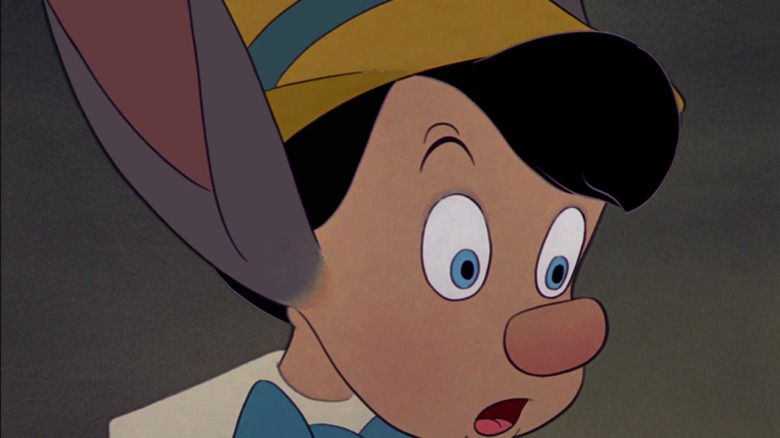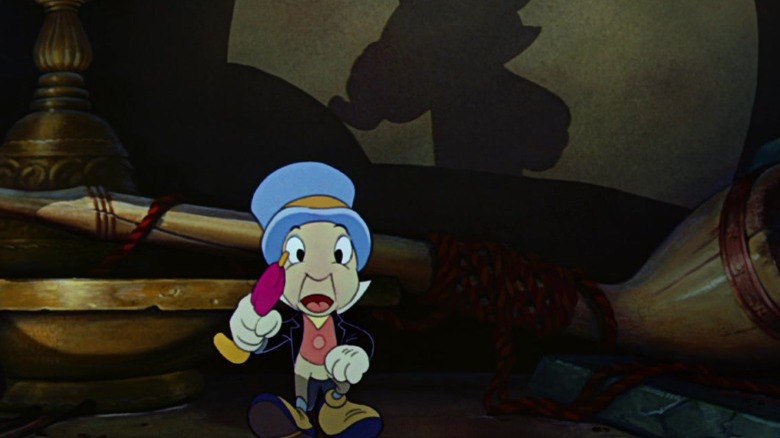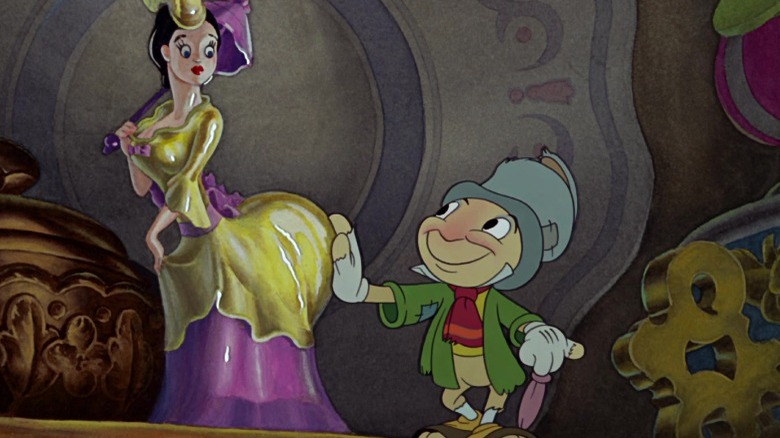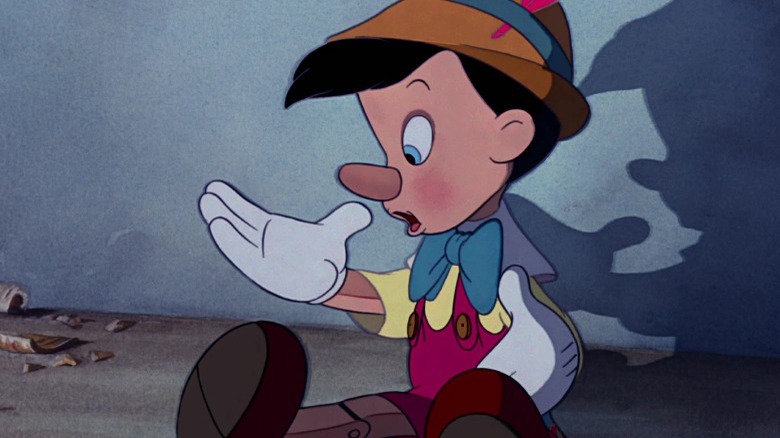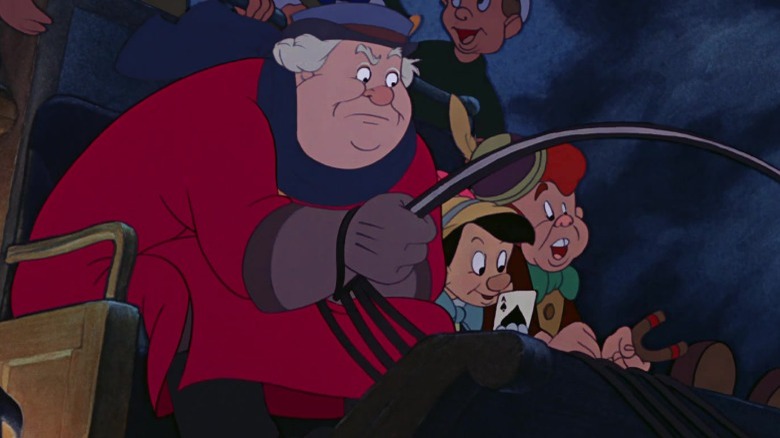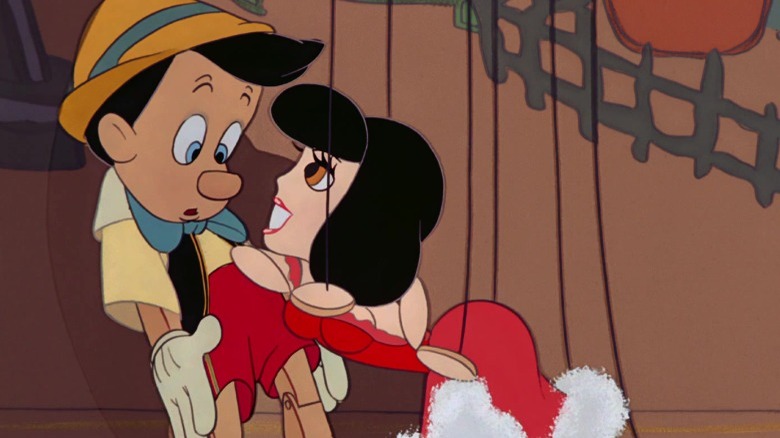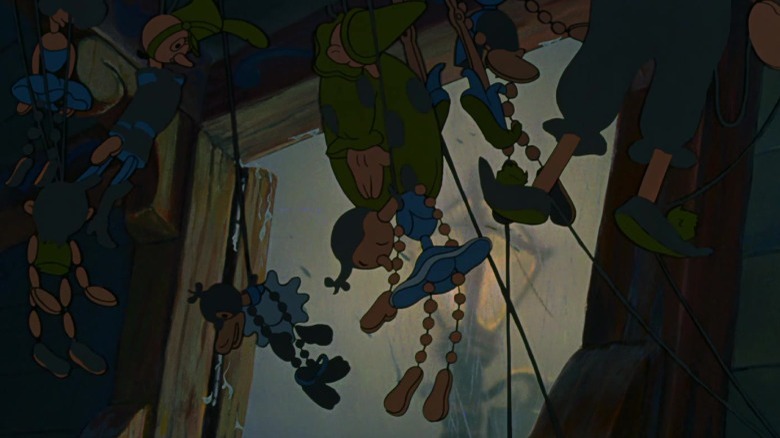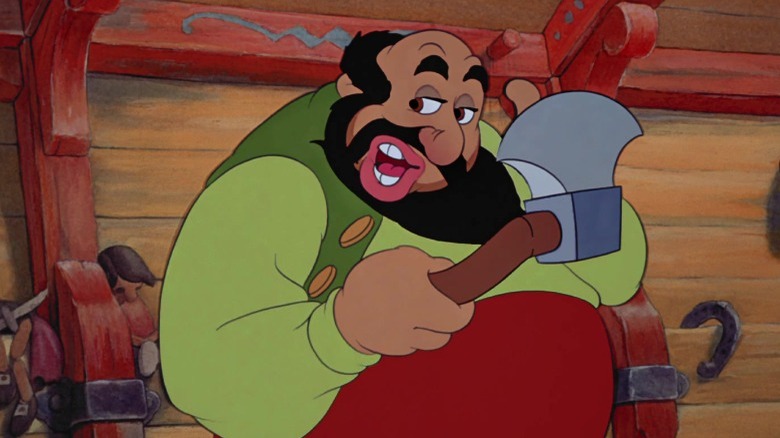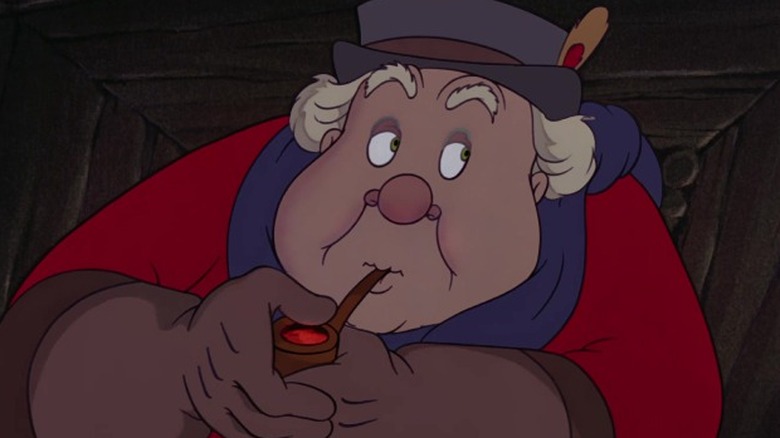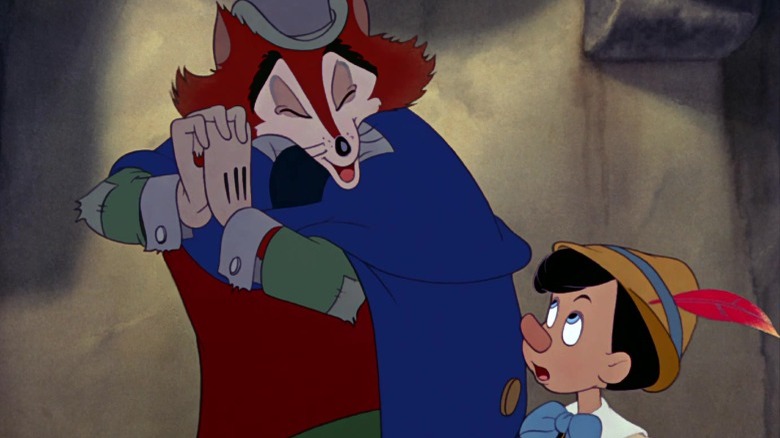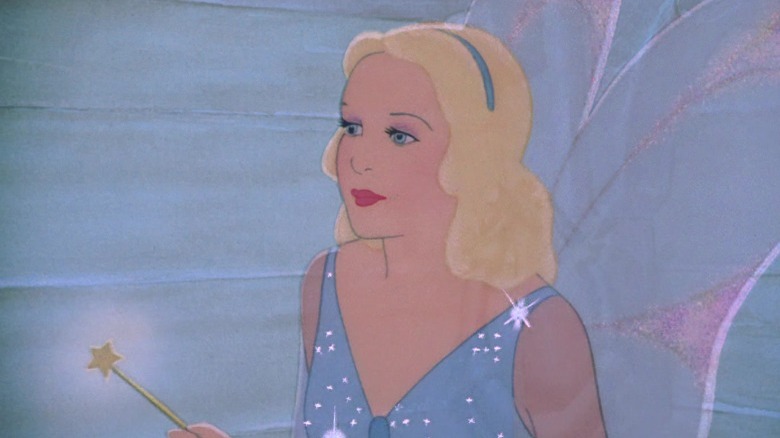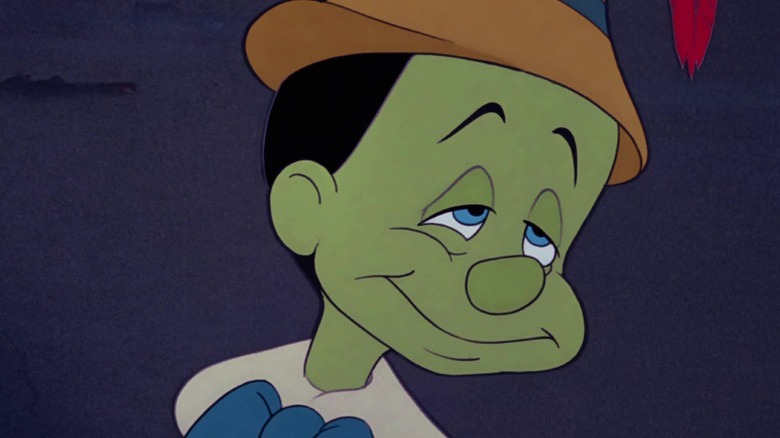Things Only Adults Notice In Pinocchio
When we say "Pinocchio," what do you think of first? Do you immediately picture a cute wooden boy skipping off to school? Or do you suddenly remember Lampwick's horrifying transformation into a braying jackass? Some of us consider it a childhood classic, while the rest of us remember burying "Pinocchio" in the back of our movie shelf so we wouldn't have to think about such a disturbing movie.
Coming back to it as adults, we can even better appreciate the film that is hailed as one of the best animated Disney movies — even if it does still give us nightmares. At a glance, it may seem like "Pinocchio" never touches on anything more serious than "Do not tell a lie," but the themes of the movie are actually quite deep: "Pinocchio" explores topics like sin, survival, and maybe even addiction.
Here are all the dark secrets of the characters you loved as a kid (we bet you didn't remember Jiminy was a playboy), and the even darker secrets of the characters that terrified you (there's a reason why even Honest John is scared of the Coachman). No strings attached, we promise!
Jiminy Cricket is a lousy conscience
Jiminy Cricket (Cliff Edwards) tries his best to be Pinocchio's moral compass, but he's not exactly an angel. While Jiminy is a loyal sidekick most of the time, he comes close to abandoning Pinocchio (Dickie Jones) not once, but twice. Watching Pinocchio perform for Stromboli (Charles Judels), Jiminy shows a surprisingly spiteful side. Still bitter that Pinocchio ignored him, the cricket says, "Go ahead, make a fool of yourself!" Jiminy splits by the end of the song. Likewise, Jiminy almost leaves his charge behind on Pleasure Island after Pinocchio calls Lampwick his "best friend." Perhaps Jiminy is a bit jealous when he declares Pinocchio a lost cause. Also, he's a bit of a hypocrite. While the cricket lectures Pinocchio about temptation, he takes a huge whiff from Geppetto's (Christian Rub) pipe.
Let's not forget the scene where Pinocchio learns that Geppetto was swallowed by a whale. To Pinocchio, there is no question of what he should do next — he's got to save his father. Meanwhile, Jiminy takes a rather cowardly turn, trying to talk Pinocchio out of it. It's not Pinocchio's cricket conscience who reminds him what needs to be done; it's Pinocchio's own moral compass. We can forgive Jiminy's imperfections — the point of the movie is that Pinocchio needs to learn to make the right choices himself, so that he won't need Jiminy anymore.
...and a womanizer
Sorry if we're ruining anybody's childhood, but the cricket who is one of Disney's most beloved talking animals is also a little bit of a playboy.
The first time he glimpses the Blue Fairy (Evelyn Venable), Jiminy whispers "Mmm-mmm!" in a way that sounds an awful lot like a wolf whistle. While singing about "the straight and narrow path," he waggles his eyebrows at a milkmaid figurine from one of Geppetto's clocks. Then he butts in on a tiny couple dancing on top of a music box, scooting between them to steal a dance with the woman. He even rests his hands on the bustle of a shiny ceramic lady (though he apologizes afterward, because he's not a complete cad). Later, when Stromboli's marionettes hike up their skirts and begin dancing the can-can, Jiminy whips out his spectacles so he can get a better look at their legs. So much for being Pinocchio's conscience.
Pinocchio's message is more complicated than it seems
Even kids will grasp that "Pinocchio" is meant to teach them to avoid temptation, but adults looking back on this film may realize the movie's message is kind of ambiguous. At best, it reminds us that the "thorny path" is a difficult one. At worst, it leaves viewers confused about whom to root for. Jiminy Cricket makes it seem like being a "good boy" is easy, but the rest of the movie reveals it is anything but.
"Pinocchio" isn't afraid to admit that sin can be persuasive — or attractive, even. Honest John (Walter Catlett) is charismatic, while Gideon (Mel Blanc) is adorable. The latter acts so much like Dopey that he makes viewers think, "Maybe he isn't so bad." Stromboli spends much of his screentime grinning or laughing. While Lampwick (Frankie Darro) never manages to be likable, we can't help but feel sorry for him when we hear him wailing for his mama. For a movie that was probably intended to teach us right and wrong, "Pinocchio" leaves us feeling awfully complicated.
All the evildoers in Pinocchio get away with it
In every other Disney movie, the bad guys get their comeuppance. Villains get stabbed through the heart (Ursula), retreat in humiliation (Shere Khan), turn out to be good guys all along (like Te Fiti from "Moana"), or fall to their deaths (basically everyone else).
But in "Pinocchio," all the wicked go unpunished. Honest John and Gideon are still roaming free, and so is Stromboli. The movie doesn't even give us the satisfaction of seeing the look on Stromboli's face when he realizes his prize puppet got away. Instead, we get the sense that there will be more little boys like Pinocchio.
And let's not forget the Coachman (Charles Judels). Pinocchio can't possibly rescue the trapped donkey boys and punish the coachman; the best he can do is survive. Apparently, consequences are just for children.
The strings in Pinocchio mean four different things
"I Have No Strings" is more than just a dangerously catchy jingle; the lyrics are loaded with double meanings. To Stromboli, the strings represent his total control over Pinocchio. To Jiminy, the strings mean the guidance of Pinocchio's conscience. To Pinocchio, the strings are just strings.
To the female marionettes who dance with Pinocchio during the song, strings have a different meaning. The entire song consists of them flinging themselves at the stringless Pinocchio. "You've got no strings, your arms [are] free/to love me," says the Dutch puppet, which we take to mean Pinocchio has no other commitments: "No strings" equals "single." The French puppet says, "I'd cut my strings for you," while the Russian one says outright that she wants to run off with Pinocchio.
Pinocchio completely misses this subtext, thank goodness; he is just flattered by his sudden popularity.
Stromboli's wagon is a graveyard for puppets
At a glance, Stromboli's wagon seems like a nice enough place. It's warmly lit with plenty of food and colorful puppets hanging from the ceiling. Sure, Stromboli is a bit of a slob compared to Gepetto, but he's so jolly that viewers see why Pinocchio makes himself at home.
That's why it's especially horrifying when Stromboli plants an ax in the belly of a beat-up old marionette, slumped like a ragdoll in a pile of firewood. The puppet still has an unsettling smile plastered on its face. Kids might pick up on the creepy tone, but only adults know that Stromboli wouldn't hesitate to do the same to Pinocchio if he outlived his usefulness. Illuminated by the burst of lightning, the slumped puppets strung up on the ceiling suddenly look like bodies hanging from the gallows.
Stromboli is the opposite of Geppetto
Adult viewers will appreciate that Stromboli is one of the first villains Pinocchio must face because he is the anti-Geppetto. The clockmaker treats his creations as if they are alive, while the Italian puppet-master sees his as objects, nothing more. Whether it's talking to his pets or giving personalities to each of his clocks, Gepetto finds humanity in unexpected places. Meanwhile, when Stromboli looks at his collection of puppets, he is only concerned with how he can use them for cash or firewood.
For Geppetto, the greatest achievement is to see one of his creations move on its own, without his help. Stromboli, on the other hand, prefers his puppets on strings so they won't run away. Geppetto, at least, is aware on some level that he will need to eventually let go; that's why he sends Pinocchio to school.
The Coachman is a human trafficker
To adults, it's clear that Pleasure Island is a thinly veiled metaphor for human trafficking. They might even reasonably believe the Coachman to be a pedophile.
The Coachman baits children with food, games, cigars, and the promise of no adult supervision, then smuggles them to a remote island where they'll never see their families again. He turns the poor kids into donkeys (so they can't tattle) and ships them out to the circus and the salt mines. The abuse isn't just physical; the Coachman scares the living daylights out of the boys and tells them they're getting exactly what they deserve.
Creepiest of all is the Coachman's explanation for why he never gets caught: "They never come back — as boys!" He could simply mean that the boys all come back as donkeys. But, on another level, he could mean that his victims lose their innocence and come back completely unrecognizable, no longer the boys they once were. Pinocchio escapes Pleasure Island, but not before sprouting two donkey ears and a tail, which symbolize that he has been "scarred for life," says The Artifice. Pinocchio is so traumatized that he's even afraid to mention his experience to Geppetto. While it's unlikely that Disney intended to raise the specter of pedophilia, it's easy to see how adults might read this.
If you or anyone you know has been a victim of sexual assault, help is available. Visit the Rape, Abuse & Incest National Network website or contact RAINN's National Helpline at 1-800-656-HOPE (4673).
Pinocchio learns about Stranger Danger the hard way
Adults appreciate "Pinocchio" as a frightening, but effective way to teach kids about Stranger Danger.
Most kids' stories don't dare go as far as this Disney movie does. For instance, the TV episode "The Berenstain Bears Learn About Strangers" carefully elides the real reasons why Sister Bear shouldn't talk to strangers. Kids will wonder what's so scary about a stranger "bothering" a kid.
"Pinocchio," on the other hand, shows the consequences in graphic detail, without being expressly labeled for purpose. It handles the topic with maturity and authenticity not often seen in children's movies, showing that bad apples can seem sweet and shiny on the surface, and that a single mistake can be nearly impossible to fix.
The Blue Fairy set Pinocchio up
Even the best-behaved kids slip up once in a while. Yet the Blue Fairy holds Pinocchio to an impossibly high standard, setting him up for disappointment.
Pinocchio's world is crawling with villains who lead our hero astray. Is it really Pinocchio's fault that he got swept up in Honest John's scams? We can't help but feel the Blue Fairy is a little harsh. Sure, Pinocchio is a liar, but if any other adult found their kid locked in a cage, they'd hug him first and scold him later. Instead, the Blue Fairy reminds Pinocchio of his terrible mistake before telling him she won't save him next time.
After Pinocchio botches his second chance, too, it seems like the only way he can redeem himself in the Blue Fairy's eyes is by sacrificing himself to save Geppetto. She could have rewarded Pinocchio for his efforts after he left Pleasure Island, or after he dove off a cliff in search of Geppetto. It's hardly fair that Pinocchio needs to die a violent death just to earn the right to be a real boy — a privilege that any other child, good or bad, receives automatically.
Pinocchio might be a metaphor for addiction
"Pinocchio" depicts smoking and drinking (common in Disney flicks until relatively recently, though "Pinocchio" stands out for showing use by child characters). If you look closely, there might be harder stuff, too. The whole movie could be interpreted as a metaphor for Pinocchio's addiction and recovery. Psychotherapist Dr. Dawn-Elise Snipes proposed this reading, and now adults can't un-see it no matter how hard we try.
It all starts when Honest John gets Pinocchio "hooked." It's hard for Pinocchio to say "no" to him, and only gets harder with each encounter. From there, Stromboli exploits the little puppet, not unlike a drug dealer. Whenever the Blue Fairy finds Pinocchio in a cage, Pinocchio feels humiliated, and his growing nose might symbolize the self-loathing that people struggling with addiction sometimes feel.
Recovery isn't easy. Pinocchio gets sucked in again after Honest John poses as a doctor and "prescribes" a visit to Pleasure Island, which might remind viewers of addiction caused by medical malpractice. Soon, he's riding the high of Pleasure Island. It's only when Lampwick starts sprouting hooves (a metaphorical overdose, perhaps?) that Pinocchio is scared into quitting.
Admittedly, the addiction angle probably wasn't what Walt intended. But he obviously meant to make a movie about temptation, and an addictive substance can be a strong one indeed.
